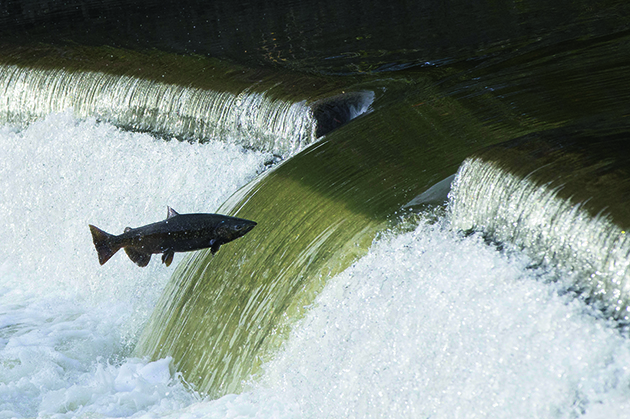GWCT launches SAMARCH salmon project
The GWCT has launched SAMARCH, a new cross-border research project, to shed light on why salmon and sea trout numbers are plummeting.

Mandatory Credit: Photo by Xinhua/REX/Shutterstock (9123729b) A salmon tries to jump over a weir during its migration to its spawning grounds on Humber River Salmon Migration, Toronto, Canada - 09 Oct 2017
The Game and Wildlife Conservation Trust (GWCT) has launched a new project, SAMARCH (Salmonid Management Round the Channel), to provide vital research on rapidly declining salmon and sea trout populations.
SAMARCH is a cross-border project, with 10 partner organisations — five in France and five in the UK — and will be conducted over five years.
DNA analysis
The project will utilise state-of-the-art fish monitoring facilities on five rivers across southern England and northern France. These include the rivers Frome and Tamar in the UK and the Scoff, Oir and Bresle in France. It will focus on the behaviour and mortality of salmonid populations in estuaries and coastal waters to determine where losses are greatest.
It will also use DNA analysis to map areas in the English Channel that are important for sea trout and provide new information to improve the tools used by the regulatory bodies in England and France to manage their salmon stocks.
“It has taken a long time to get here and a huge amount of effort has gone into this project to make it a realisation,” said the GWCT’s director of research Professor Nick Sotherton.
Salmon facing myriad threats
A huge decline in the number of young wild salmon returning to British rivers could lead to a national shortage,…
Seventy per cent declines
Dylan Roberts, head of fisheries at GWCT and project manager, told Shooting Times: “This research is important because Atlantic salmon and sea trout have declined by around 70 per cent since the 1970s.” He added that the “best-case scenario” would be “to gain better knowledge and understanding of salmonids and their swimming depths to further better the management of rivers, estuaries and coastlines that
these fish swim through”.
Mr Roberts also stated that the output would be transferable and relatable to other areas in the UK. The project will also turn its attention to the sea as most investigations on salmon and
sea trout have taken place in a freshwater environment. He said that it is a pivotal move to focus on saltwater projects as only “five per cent of young salmon return to the rivers they originated from”.
SAMARCH is part-funded by the Interreg France (Channel) England programme. Mr Roberts said he is delighted by the support and “we look forward to working with our partners over the next five years”.









